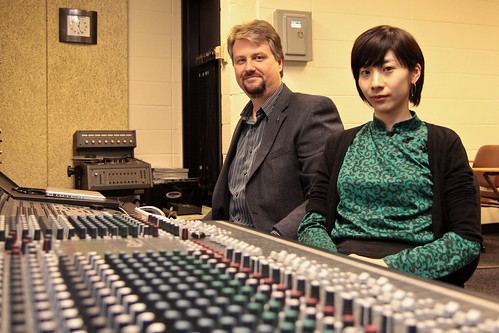
One year after the March 11, 2011 earthquake and tsunami in Japan, BTMM professor Jack Klotz and alumna Naoko Masuda composed a song.
Jack Klotz, assistant professor of broadcast, telecommunications and mass media knows that a child’s curiosity can go a long way. After showing his 2 and a half year old son a series of bilingual language videos, there was one that really stuck.
“For whatever reason, he took to Japanese,” Klotz said, noting that his son liked the sessions so much that he would say, “Daddy, again” when the video finished.
Klotz and his wife then immersed themselves in Japanese culture and soon sought a language teacher for their son. That’s how Klotz met senior web developer for the School of Communications, alumna Naoko Masuda.
As Masuda and Klotz were planning a cross-cultural Japanese dinner, disaster struck. On March 11, 2011 an earthquake and tsunami hit the Pacific Coast of Tōhoku in Japan. More than 15,000 people lost their lives in the aftermath.
Masuda and Klotz reached out to Japanese composer, Satoru Sasaki to begin working on a song in memorial of that event. “Fukkatsu no Uta,” or the “Song of Rising,” the Japanese-American effort entirely written and sung in Japanese was officially released this month.
As “Fukkatsu no Uta” was finished just in time for the one year anniversary of the earthquake, there were some hurdles for Klotz and Sasaki, the language barrier being the most prevalent.
“I would joke, it would take me an hour to write an email [to Sasaki],” Klotz said, referring to how he corresponded to write the Japanese language song from his ideas in English.
Masuda also had concerns about how to relay the song to the Temple community.
“We were trying to send good energy and support …but people are not going to understand the meaning of the song. How can I help to make the story translatable?” Masuda said.
The answer led Masuda to create a video with the lyrics translated in English to help people at Temple understand. The video contains colorful imagery of a growing tree that helps to mirror the message in the song’s lyrics. The actual song begins with an instrument track recorded by Klotz and includes a chorus sung by students.
Masuda and Klotz received a positive response from those in the community who watched the video and heard the song.
“They said ‘good job, this is excellent,’” Masuda said. “A lot of professors gave good feedback.”
Even the local media has taken note of their efforts. Klotz and Masuda were interviewed by the local CBS radio station, KYW. Masuda said she thinks that this gave the song some positive publicity.
“Just the fact that anybody heard it on the radio and thought about it for a split second made me happy,” Masuda said.
Taking note of cultural aspects in Japan, Masuda said that the song had a different effect overseas. She described how in some places that were directly affected by the Earthquake, there is agreement for silence.
“There is definitely a spirit that a person has to be quiet. You have to respect the dead spirits,” she said.
Masuda said that the uplifting nature of the song may help influence a different attitude.
“This is the kind of music they need to hear right now,” she said. “Maybe this is what they need…for recovery.”
Masuda said she believes that Americans definitely have a part to play in helping to alleviate the crisis in Japan.
“The really scary thing is that it’s going to continue. It’s not just some Japanese domestic problem. It’s an international agenda,” she said.
She also spoke of how international concern sends appreciative messages to the people in Japan, who are still suffering from issues such as nuclear fallout and joblessness.
“Japanese people are very curious about how foreign media is covering this,” Masuda said, referring to how there was a lack of coverage in the American media.
Masuda thinks the song would help that discrepancy.
“I wanted them to understand that Americans are still paying attention,” she said.
Anthony May can be reached at anthony.may@temple.edu.


Be the first to comment